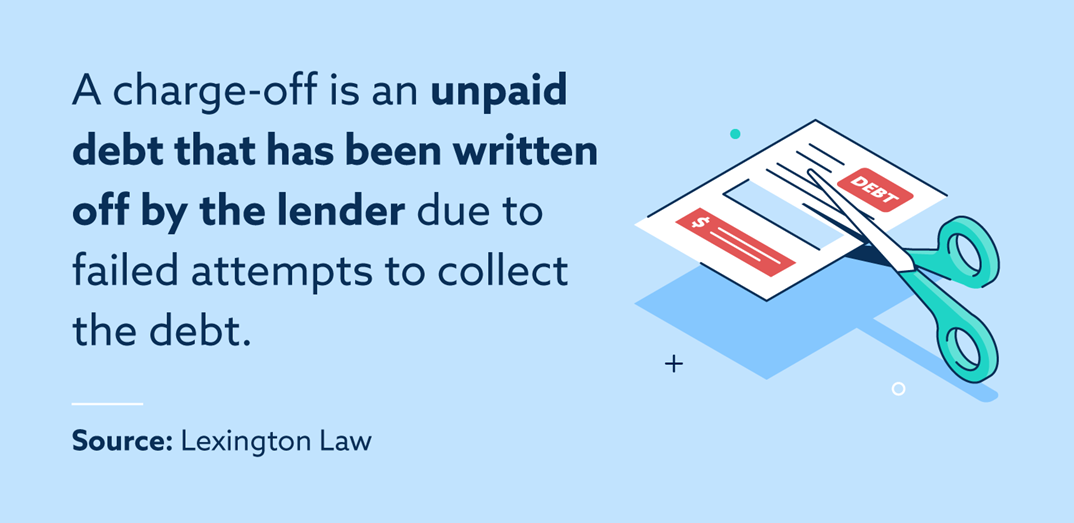Have you ever wondered what happens when a creditor “charges off” your debt? Turns out, it’s not as harmless as it sounds. When a lender writes off a debt as a loss, it is labeled as a “charge-off as bad debt” on your credit report. This seemingly innocuous label can have long-term consequences for your credit score and your ability to borrow from lenders in the future. Despite the write-off, you still have a legal obligation to repay the debt, and the charge-off will remain on your credit report for around seven years. However, there are steps you can take to mitigate the damage, such as negotiating a pay-for-delete agreement or implementing financial strategies to prevent future charge-offs.
Understanding Charge-Offs
Definition of a charge-off
A charge-off occurs when a lender writes off a debt as a loss. It is marked as “charged off as bad debt” on your credit report, indicating that the lender does not expect to collect the amount owed. However, it is important to note that a charge-off does not mean you are no longer legally obligated to pay the debt.
How a charge-off occurs
A charge-off typically occurs when you have not made payments on a debt for a certain period of time, usually around 180 days. The lender determines that the chances of collecting the debt are slim and decides to charge it off. This does not absolve you of the debt, but rather shifts it from the lender’s accounts receivable to their bad debt category.
Legal obligation towards charged-off accounts
Despite the charge-off status, you remain legally obligated to pay the debt. The charge-off does not erase your responsibility to repay what you owe. The lender may still attempt to collect the debt through various means, such as hiring a collection agency or taking legal action against you. It is important to understand that the charge-off does not release you from this obligation.
Effect of a Charge-Off on Your Credit Score
How a charge-off affects your score
A charge-off has a significant negative impact on your credit score. It indicates to future lenders that you have not fulfilled your financial obligations and may be a risk to lend to. This can result in higher interest rates, difficulty obtaining new credit, or even denial of credit applications. Your credit score may drop by several points, depending on other factors in your credit history.
Comparing the impact of a charge-off with other credit damaging actions
While a charge-off is indeed detrimental to your credit score, it is important to note that it is not the only factor that affects your creditworthiness. Late payments, bankruptcies, and foreclosures also have negative impacts on your credit. However, a charge-off is still highly damaging and can significantly impact your ability to secure new credit in the future.

This image is property of www.lexingtonlaw.com.
Duration of a Charge-Off on Your Credit Report
Typical length of a charge-off on a credit report
A charge-off remains on your credit report for approximately seven years from the date of the first delinquency that led to the charge-off. This means that the negative impact on your credit score can linger for quite some time. However, as the charge-off gets older, its impact on your score gradually diminishes.
Factors that might affect the duration
There are certain factors that might affect the duration of a charge-off on your credit report. For example, if you make a payment or enter into a payment arrangement with the lender after the charge-off, it may update the status on your credit report. Additionally, if you are able to negotiate a pay-for-delete agreement with the lender (which will be discussed later in this article), the charge-off may be removed from your credit report entirely.
Consequences of a Charge-Off on Your Financial Life
Difficulties in securing future credit
One of the major consequences of a charge-off is the difficulty it presents in securing future credit. Lenders look at your credit history to assess your creditworthiness, and a charge-off is a red flag. It signals that you have not fulfilled your financial obligations in the past and may be a high risk for potential lenders. As a result, you may face higher interest rates, stricter loan terms, or even denial of credit applications.
Implications for mortgage or rent application
A charge-off can also have implications for your ability to secure housing. Both landlords and mortgage lenders often consider credit scores and credit reports when evaluating rental or mortgage applications. A charge-off on your credit report may cause them to view you as a risky applicant and could lead to rejection or unfavorable lease terms. It is important to consider how a charge-off may impact your housing applications.
Possible impact on employment opportunities
In certain industries and job roles, a person’s credit history may be taken into consideration during the hiring process. Some employers view credit history as an indicator of financial responsibility and trustworthiness. A charge-off on your credit report could potentially raise concerns for employers and impact your chances of being hired for certain positions. It is important to be aware of this potential impact and take steps to rebuild your credit if necessary.

This image is property of www.lexingtonlaw.com.
Recovering From a Charge-Off Implication
Effort to rebuild credit
Recovering from a charge-off requires a deliberate effort to rebuild your credit. Start by reviewing your credit report and ensuring that all information is accurate. Dispute any errors or inaccuracies that may be dragging down your credit score. Additionally, focus on making timely payments on your current debts and demonstrate responsible financial behavior over time. This will gradually help improve your credit score and mitigate the negative impact of the charge-off.
Potential strategies for negotiating with lenders
It may be possible to negotiate with your lender to improve the status of the charge-off on your credit report. One potential strategy is to offer a settlement payment, wherein you pay a smaller portion of the debt in exchange for the removal or update of the charge-off. Another option is to negotiate a payment plan with the lender, where you agree to make regular payments towards the debt. This shows a willingness to take responsibility for the debt and may result in a more positive outcome for your credit.
Negotiating a Pay-For-Delete Agreement
Understanding a pay-for-delete agreement
A pay-for-delete agreement is a potential solution for removing a charge-off from your credit report. It involves negotiating with the lender to pay a portion of the debt in exchange for the removal of the charge-off from your credit report. This can significantly improve your credit score and increase your chances of securing future credit. However, it is important to note that lenders are not obligated to agree to a pay-for-delete arrangement, and it may not always be a feasible option.
Factors to consider before pursuing a pay-for-delete agreement
Before pursuing a pay-for-delete agreement, there are several factors to consider. First, evaluate your financial situation and determine if you can afford to make a settlement payment or pay off the debt in full. Additionally, research the lender’s willingness to negotiate and their history of accepting pay-for-delete arrangements. It is also crucial to ensure that any agreement you reach with the lender is documented in writing to protect yourself and avoid any future disputes.
Steps to negotiate a pay-for-delete agreement
To negotiate a pay-for-delete agreement, follow these steps:
-
Contact the lender: Reach out to the lender and express your willingness to resolve the debt. Explain that you are interested in entering into a pay-for-delete agreement to remove the charge-off from your credit report.
-
Offer a settlement: Offer a percentage of the total debt as a settlement payment. Negotiate with the lender to find a mutually acceptable amount that you can afford to pay.
-
Get the agreement in writing: Once you have reached an agreement with the lender, insist on getting the terms of the pay-for-delete agreement in writing. This will serve as evidence of the agreement and protect both parties.
-
Make the payment: Fulfill your end of the agreement by making the settlement payment to the lender. Ensure that you keep records of the payment for future reference.
-
Follow up and monitor your credit report: After making the payment, monitor your credit report closely to ensure that the charge-off is removed as agreed upon. Contact the credit reporting agencies if necessary to have any discrepancies corrected.

This image is property of www.lexingtonlaw.com.
Long-Term Credit Health After a Charge-Off
Expectations of credit health post charge-off
After a charge-off, it is important to have realistic expectations about your credit health in the long term. While you can take steps to improve your credit score and rebuild your credit, the impact of a charge-off may linger for some time. It is important to be patient and consistent in your efforts to prove your creditworthiness to lenders.
Timeline of credit score recovery after a charge-off
Recovering your credit score after a charge-off is not an overnight process. It takes time and consistent positive credit behavior. Depending on various factors such as the age of the charge-off, your overall credit history, and other positive financial behaviors, you may start to see improvements in your credit score within a year or two. However, it can take several years for your credit score to fully recover and for the impact of the charge-off to diminish significantly.
Preventing Future Charge-Offs
Establishing an emergency fund
One of the best ways to prevent future charge-offs is to establish an emergency fund. By setting aside a portion of your income each month, you can build a financial cushion to help cover unexpected expenses or temporary financial hardships. With an emergency fund, you are less likely to fall behind on payments and accumulate debt that could potentially lead to a charge-off.
Budgeting expenses wisely
Another important step in preventing future charge-offs is to budget your expenses wisely. Create a budget that includes all your income and expenses, and prioritize your financial obligations. Ensure that you allocate enough money each month to pay your debts on time and in full. By sticking to a budget, you can avoid unnecessary spending and stay on track with your financial obligations.
Communicating proactively with lenders
Maintaining open and proactive communication with your lenders is crucial in preventing charge-offs. If you are facing financial difficulties or anticipate that you may struggle to make payments, reach out to your lenders as soon as possible. Many lenders are willing to work with you to create a payment plan or modify the terms of your loan to help you stay on track. By communicating proactively, you can often avoid charge-offs and maintain a better relationship with your creditors.

This image is property of www.lexingtonlaw.com.
Lessons from a Charge-Off Experience
Crucial financial management skills learnt
Experiencing a charge-off can be a valuable lesson in financial management. It highlights the importance of responsible financial behavior, such as making payments on time, budgeting, and communicating with lenders. It serves as a reminder to prioritize your financial obligations and take proactive steps to avoid future financial difficulties.
Importance of credit responsibility
A charge-off experience underscores the importance of credit responsibility. It emphasizes the significance of maintaining a good credit history, making timely payments, and keeping debt levels under control. By taking responsibility for your credit, you can avoid the negative consequences of a charge-off and build a solid foundation for your financial future.
Seeking Professional Help After a Charge-Off
Role of credit counseling agencies
Credit counseling agencies can play a valuable role in helping individuals recover from a charge-off and improve their credit health. These agencies provide financial education, counseling, and debt management plans to help individuals regain control of their finances. They can assist in developing a realistic repayment plan and negotiating with lenders on your behalf.
When and why to consider a credit repair company
In some cases, individuals may consider hiring a credit repair company to assist with the recovery process after a charge-off. Credit repair companies specialize in identifying errors on credit reports, disputing inaccuracies, and working with creditors to negotiate resolutions. It is important to carefully research and choose a reputable credit repair company, as there are unfortunately some fraudulent companies in the industry. Consider consulting with a credit counseling agency first, as they may be able to provide similar services at a lower cost or for free.
In conclusion, understanding charge-offs is crucial to navigate the implications they have on your credit score, financial life, and long-term credit health. While charge-offs can have damaging effects, it is possible to recover and prevent future charge-offs by taking proactive steps, such as establishing an emergency fund, budgeting wisely, and practicing credit responsibility. Seeking professional help, whether through credit counseling agencies or credit repair companies, can also provide guidance and support during the recovery process. Ultimately, by learning from the experience and implementing positive financial management skills, you can rebuild your credit and regain financial stability.

This image is property of www.lexingtonlaw.com.
